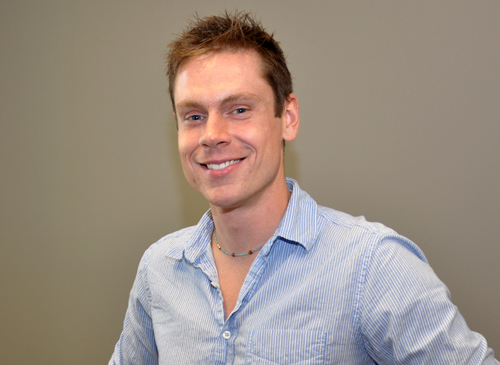
Matt Demers once sat in the same seats as his first-year students. Now a professor in the School of Engineering, he’s applying what he learned as a student as well as the teaching skills he picked up from two of his most influential professors: Jack Weiner and Herb Kunze, Department of Mathematics and Statistics.
Although Demers was good at math, he admits that it wasn’t his favourite subject in high school. But Weiner changed his mind. If it wasn’t for Weiner’s first-year calculus class, Demers may never have switched his major from physics to math. “Jack’s calculus class was where it all started,” says Demers, M.Sc. ’07 and PhD ’12.
Not only did Demers learn calculus in that class, but he also learned teaching techniques that he uses in his own classes today. Following Weiner’s example, he makes it a priority to be available to students after class and offers up to 10 hours of group tutorials per week. With almost 900 students in his first-year calculus class and second-year applied differential equations class, he finds it more efficient to hold group tutorials instead of individual appointments. He says some students feel more comfortable asking questions in small groups than during his lectures.
So many students attend his office hours that he books another room to accommodate them. Sometimes as many as 40 students show up.
If students cannot attend his office hours, Demers is always available via email. If you have a burning mathematical question at 11:30 p.m. or on a weekend, he will do his best to answer it promptly. “From day one, I always try to make it clear to students that they should feel very welcome to come and talk to me and they should feel very welcome to ask questions either in class or through email.”
No matter where he is or what he’s doing, ideas for math problems are always popping up in his head. His inspiration often comes from his own interests, such as video games, which he compares to learning, because each level builds on the one before it. Even word puzzles have a way of finding themselves into his math problems. “Putting effort into creating new material every year is really important to me,” he says.
He doesn’t want students to memorize how to solve math problems; he wants them to be able to apply what they learned in different ways. His tests often include “extension questions,” which are based on questions he covered in class – with a twist. “I love coming up with challenging questions. It’s part of the fun of the job. I have a little more fun than I should putting together tests.”
Demers consistently receives high marks on teaching evaluations from his students, but he insists that he isn’t doing anything special. “We’re in this together, and we’re a team trying to get through this course, and the goal for both of us is for you to understand the material.” He encourages students to work together on take-home assignments. Doesn’t that encourage cheating? Possibly, he acknowledges, but students who copy each other’s work are only hurting themselves when it comes time to write the midterm and final exams. “Spend the time to do them honestly, and it will pay off,” he says.
Having taught the same courses in fall 2012, Demers provides his students with the material he covered so they won’t be tempted to buy notes from other students. Since what he covers in class is new every year, students can use the previous year’s material for review.
To keep his course material relevant, he often consults with engineering professors to find out what they’re teaching in their classes so that he can develop problems and examples in his own class.“Not only are they learning my stuff, but they’re learning stuff that’s relevant for their other courses and maybe they can appreciate the connections,” says Demers. “When students see that, they respect the material more, and they’re more likely to hold onto it.”
He has worked as a sectional instructor since 2007 and credits his mentors for inspiring him to teach. “Jack and Herb were great,” he says. “They provided a really good template for how I do things now.” Both professors were always willing to provide extra help during their office hours, which inspired him to do the same for his own students. “I absolutely love my job,” he says, adding that he enjoys working with students the most. “That’s always been the number one thing for me.”